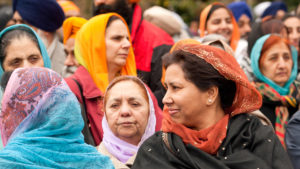
Editor’s Note: During this week surrounding World Refugee Day, we are spending some time highlighting the reasons and the opportunities for Christians to be engaged in ministry to this group of marginalized and vulnerable people. You can read more about principles for refugee ministry here, and ideas for serving refugees here.
Imagine being a refugee landing in the United States for the first time. You’ve been waiting for years for the opportunity to start your life again. You haven’t had a home to call your own, your children have only sporadically attended school, and your spouse suffers from insomnia and nightmares about the violence that drove you from your country. You don’t speak English, and you have no idea how to get started in a new country.
“As followers of Jesus, we need to stand ready to embrace those who arrive in our cities and neighborhoods.”
Refugees have an array of hopes and fears as they acclimate to a new culture and a new way of life. As followers of Jesus, we need to stand ready to embrace those who arrive in our cities and neighborhoods. We have a ready opportunity to impact their hearts and lives for the gospel as they resettle in our midst. Here are seven powerful and practical ways to welcome them into your community.
1. Greet Newly Arrived Refugees
Greet and transport a newly arrived refugee family from the airport to their new home. Meet them with a welcome basket filled with information about their new community, including emergency contact information, maps, invitations to your church worship services, tutoring sessions, and ESL classes, as well as a note telling them how happy you are to have them in your community.
2. Be a Friend
If you’ve ever moved to a new neighborhood, you understand that you don’t truly feel settled until you’ve been welcomed by new friends and neighbors. According to Terry Sharp, diaspora network leader for IMB (and my husband), most refugees are accustomed to being ignored, and loneliness is one of their greatest challenges.
For help getting to know a family and becoming a part of their lives as they adapt to a new country and culture, connect with the local resettlement agency that sponsors new refugees in your community, and learn about their volunteer opportunities.
3. Visit Refugees in Their Homes
As with any friendship, you must make time for your new friends. Visit them frequently in their homes, and bring along a basket of fruit or a freshly baked cake. Allow time to stay and chat. Ask them questions about their family’s stories and how they came to arrive in your community. Learn about their favorite foods and customs. They’ll likely be happy to share.
In return, you can share more about your family and some of your favorite traditions. If you’re invited to a meal, try everything. They’ll be happy to share their very best with you, even when they have a limited amount to give.
4. Help Refugees Adapt to Their New Communities
Take your refugee friends shopping and explain the different types of stores in your community. Help set up phone service and doctor’s appointments. You can also assist them in registering their children for school and showing them how to use public transportation.
5. Share Your Home and Life
Open your home and welcome a refugee family into your everyday life. Share important milestones by inviting them to birthday parties. Invite them to participate in routine family activities throughout the year. Teach them how to build a snowman, and serve hot chocolate or make homemade cookies. Take them for their very first roller coaster ride at a local amusement park. Invite them to your children’s baseball or soccer games or to be your guests at a professional sporting event. Host them for their very first American picnic or cookout.
5. Share Special Holiday Traditions
Invite your refugee friends to take part in your special holiday traditions at Thanksgiving, Christmas, Easter, and any other festivities that may be new to them. Share the American tradition of thankfulness with a traditional turkey dinner. Plan your favorite Christmas recipes, sing carols, and give each family member a special gift. In the spring, invite them to the Easter service with your church. Special occasions like these can make your new friends feel honored and provide wonderful inroads to explain your hope in Jesus and the difference he makes in your daily life.
6. Strategic Church and Associational Involvement
Churches and associational networks also have strategic opportunities to be a blessing to refugees in their area. Not only can they provide cross-cultural evangelism training to their members who will be building relational bridges, but they can also provide venues for larger community outreach. Consider the following ministry possibilities:
- ESL (English as a Second Language) classes for adults and tutoring sessions for children
- Health screenings and basic health care
- Classes on citizenship, budget planning, banking, and driver’s education
- A furniture bank where families can obtain essential household goods
- Job boards to post hiring opportunities
- Baby showers for new mothers
Ask the Lord to give you his heart for the refugees in your community. Perhaps Jesus has placed specific families in your area so that you could be the one to demonstrate the gospel to them. Showing and sharing his love and compassion to refugees in your community can be one of the most strategic and rewarding global missions experience you will ever have.


